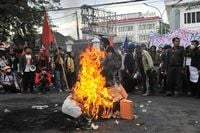As Indonesia finds itself in the throes of its most turbulent civil unrest in years, the nation has been gripped by a wave of protests, government crackdowns, and mounting fears over the possibility of martial law. What began as outrage over lawmakers’ lavish perks has quickly spiraled into a broader movement, drawing in thousands of demonstrators, prompting a heavy-handed response from security forces, and raising uncomfortable questions about the limits of state power and civil liberties.
The unrest erupted in late August 2025, when news broke that members of parliament were set to receive housing allowances nearly ten times the minimum wage in Jakarta. This revelation, coming amid widespread economic hardship and austerity measures, proved to be the spark that ignited pent-up frustration across the archipelago. According to AFP, at least 500 protesters gathered outside the national parliament in Jakarta on September 1, watched closely by soldiers and police. But the capital was just one of many flashpoints: demonstrations and clashes broke out in cities from Gorontalo on Sulawesi to Bandung on Java, Palembang on Sumatra, Banjarmasin on Borneo, Yogyakarta on Java, and Makassar on Sulawesi.
In Gorontalo, protesters clashed with police, who responded with tear gas and water cannon. In Bandung, demonstrators hurled Molotov cocktails and firecrackers at the provincial council building, while police fired tear gas overnight at what they described as “suspected... anarchists” who blocked a road. The unrest turned deadly in Makassar, where a fire set by protesters at a council building claimed at least three lives, and a fourth person was killed by a mob in a case of mistaken identity. Another confirmed victim was a student in Yogyakarta, who died in clashes. In total, at least six people have been killed since the protests began, according to reports from AFP and Reuters.
The violence intensified after footage circulated showing a paramilitary police unit running over a 21-year-old delivery driver, Affan Kurniawan, late on August 28. Outrage over the incident fueled further protests and led to a rare public apology and investigation from the police. Agus Wijayanto, head of the accountability bureau at the National Police, told reporters that two officers involved in the van incident "could be dishonourably discharged." Yet, for many Indonesians, this gesture was not enough to restore trust in the authorities or quell the anger on the streets.
President Prabowo Subianto, who took office less than a year ago, found himself facing the worst unrest of his tenure. On September 1, he warned that protests should end by sundown, citing the law’s requirement for demonstrations to have official permission and to conclude by 6:00 pm. During a hospital visit to injured police officers, Prabowo criticized the protesters, stating, "The law states that if you want to demonstrate, you must ask for permission, and permission must be granted, and it must end at 6:00 pm." Despite these admonitions, the demonstrations continued, with experts warning that the government’s U-turn on lawmaker perks—announced in a speech by Prabowo and a subsequent revocation of some benefits by parliament—may not be enough to dispel the unrest.
The government’s response has been forceful. Police set up checkpoints and deployed snipers in Jakarta, while the military conducted city-wide patrols. Schools and universities in the capital switched to online classes, and civil servants were asked to work from home. The normally congested streets of Jakarta fell eerily quiet. According to Jakarta Metropolitan Police Inspector General Asep Edi Suheri, police arrested 1,240 people in the capital since August 25. Among those detained was activist Delpedro Marhaen, director of the NGO Lokataru Foundation, who was arrested "on suspicion of making provocative incitement to commit anarchic actions," Jakarta police spokesman Ade Ary Syam Indradi told Kompas TV.
The scale of the crackdown has alarmed human rights organizations. The Commission for the Disappeared and Victims of Violence reported that as of September 1, there were 23 reports of missing persons, with 20 still unfound after verification. These missing individuals were last seen in Bandung, Depok, and various parts of Jakarta, as well as one in an unknown location. Human Rights Watch deputy Asia director Meenakshi Ganguly condemned the authorities’ actions, saying security forces "acted irresponsibly by treating the protests as acts of treason or terrorism" and called for investigations into any officers involved in violence.
International concern has also mounted. On September 1, United Nations human rights office spokeswoman Ravina Shamdasani issued a statement urging investigations into the alleged use of unnecessary or disproportionate force by Indonesian security forces. "We are following closely the spate of violence in Indonesia in the context of nationwide protests over parliamentary allowances, austerity measures, and alleged use of unnecessary or disproportionate force by security forces," Shamdasani said. She emphasized the importance of dialogue to address the public’s concerns.
As the crisis deepened, the economic impact was felt too. The Indonesian stock index plunged more than three percent at the open on September 1 before recovering slightly, ending the day down 1.2 percent. In a sign of the government’s anxiety over further unrest, TikTok suspended its live feature in Indonesia for "a few days" starting August 30, a notable move in a country with more than 100 million users of the platform. President Prabowo also canceled a planned trip to China for a military parade commemorating the end of World War II.
Against this backdrop, fears of martial law have loomed large. Indonesia has a history of imposing martial law in times of crisis, such as in Aceh in 2003 and East Timor in 1999. The region has seen similar measures recently: Thailand declared martial law in July 2025 due to a border conflict, South Korea briefly imposed it in December 2024, and Myanmar only revoked its years-long martial law on July 31, 2025. However, as of September 2, Indonesia’s Deputy Military Commander has refuted suggestions that martial law is imminent, aiming to calm public anxiety.
Still, the situation remains volatile. Protesters like university student Nafta Keisya Kemalia have voiced their determination: "Our main goal is to reform the parliament. Do they want to wait until we have martial law?" Meanwhile, ordinary Indonesians, such as 60-year-old snack seller Suwardi, express deep skepticism about the government’s willingness to listen: "The Indonesian government is a mess. The cabinet and parliament will not listen to the people’s pleas. We have always been lied to."
As Indonesia stands at a crossroads, the coming days may prove decisive in shaping the country’s democratic future and the delicate balance between order and liberty.





